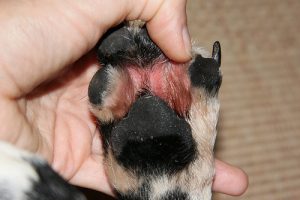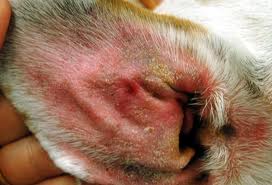 Have you noticed your dog scratching themselves? Or chewing or licking at their feet? Or troubling their ears excessively? This sounds like the introduction from a dodgy infomercial from the 80’s but unfortunately, ‘the itch’ is real.
Have you noticed your dog scratching themselves? Or chewing or licking at their feet? Or troubling their ears excessively? This sounds like the introduction from a dodgy infomercial from the 80’s but unfortunately, ‘the itch’ is real.
There are an infinite number of causes of itching, but for this blog, we’ll be focussing on allergies and specifically atopic dermatitis.
Atopic dermatitis is one of the most common dermatological problems we see here at McDowall Veterinary Practice. At this time of the year one in three of every dog that we see is suffering from this!!
Atopy is an irritating skin disease (for both pet and owner!) where the animal is allergic to airborne allergens (pollens, dust etc.). It typically shows itself as itchiness and redness of the feet, muzzle, ears, armpits, or groin. (Sound familiar?!) Atopic animals usually rub, lick, chew, bite, or scratch incessantly causing hair loss and reddening of the skin in these areas. A tell tale clue is when you see the dark brown saliva staining of their feet and around their mouths.
“That’s great” you may say, “but how do I go about fixing my dog?” Well firstly, we have to make sure that this is the cause of the itch, as there are many concurrent conditions that can cause similar symptoms. Secondly, in most cases, there are several conditions that “add” together to cause an animal to itch, where each individual substance alone would not be enough to cause an itching sensation i.e. food allergies, external parasites (fleas, mites, lice), bacterial/yeast infections etc.
 Therefore, it is important to treat and manage any other problems that could be making your pet itch while dealing with atopy. Every patient is different and requires a customised treatment plan formulated (by our fantastic vets) that is best suited to them.
Therefore, it is important to treat and manage any other problems that could be making your pet itch while dealing with atopy. Every patient is different and requires a customised treatment plan formulated (by our fantastic vets) that is best suited to them.
Unfortunately at this point in time there is no single magic pill, lotion or potion available to completely cure canine atopic dermatitis, but we can manage it successfully, a bit like controlling “hayfever” in humans. The first trick is to treat those things that we can control, such as preventing secondary bacterial or yeast infections (which themselves may be itchy!), preventing access to flea bites and avoiding direct contact with flowering plants or grasses. We can also reduce the pollen load on our pets skin by washing them with an oatmeal based shampoo once weekly. We also have medications that can turn off the itch response as well as reduce the body’s over – zealous inflammatory response to allergens. The rate of advancement in treatment options available is accelerating and in the last 2 years we have had some amazing drugs added to our arsenal to fight this condition.
 Every case of allergic dermatitis is different and each patient will require slightly different combinations of medications and diet to help control their itch. This will also vary with the seasons, so unfortunately this is one condition that requires a lot of perseverance and patience to conquer, but here at McDowall Vets, we’re here to support you every step of the way! It is so wonderful for us to see the relief to pets ( and their owners) when the itch is finally conquered!
Every case of allergic dermatitis is different and each patient will require slightly different combinations of medications and diet to help control their itch. This will also vary with the seasons, so unfortunately this is one condition that requires a lot of perseverance and patience to conquer, but here at McDowall Vets, we’re here to support you every step of the way! It is so wonderful for us to see the relief to pets ( and their owners) when the itch is finally conquered!
Spring and summer are the worst times of the year for this condition, so if you have noticed your pet itching or chewing their feet, come in to see us – we can definitely help!
Also, If you haven’t already read our previous blog about how to best look after your pet’s skin and coat please visit the following link. In it, we discuss everything about the largest organ in our body, the layers it is made of and what we can do to help maintain it!
https://mcdowallvets.com.au/love-glossy-coat/

